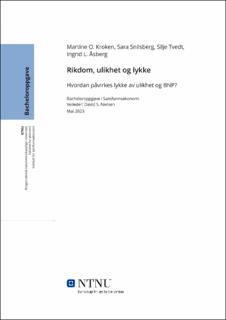Rikdom, ulikhet og lykke
Bachelor thesis
Permanent lenke
https://hdl.handle.net/11250/3092151Utgivelsesdato
2023Metadata
Vis full innførselSamlinger
Sammendrag
I denne oppgaven undersøkes det hvordan BNP og Gini-koeffisienten, samt andre relevante faktorer som velferdssystem og korrupsjon, påvirker lykkenivået i et land. Dataene som brukes i analysen er hentet fra “World Happiness report”, som inkluderer flere spørreundersøkelser stilt til et utvalg av innbyggerne i ulike land fra 2019. For å besvare problemstillingen benyttes minste kvadraters metode (MKM). Tre ulike modeller blir testet ut, der ulike sett av variabler inkluderes. Resultatet av analysene viser at BNP per innbygger og Gini-koeffisienten har en signifikant påvirkning på lykke når de betraktes hver for seg. Når det legges til andre variabler, er de ikke lenger signifikante. BNP og Gini-koeffisienten vil da påvirke lykke indirekte, ved å påvirke de andre variablene. This paper explores how the GDP and Gini-coefficient, as well as other relevant variables like welfare system and corruption, affect happiness in a country. The data used is collected from the “World Happiness report”, which includes multiple surveys questioning a selection of citizens from different countries, carried out in 2019. To answer our problem statement the ordinary least squares method (OLS) is used. Three different models are tested, whereas different variables are included. The result of the analysis shows that both GDP per capita and the Gini-coefficient has significant effect on happiness, when considered on their own. When other variables are added, they are no longer significant. GDP and the Gini-coefficient effects happiness indirectly, by affecting the other variables.
